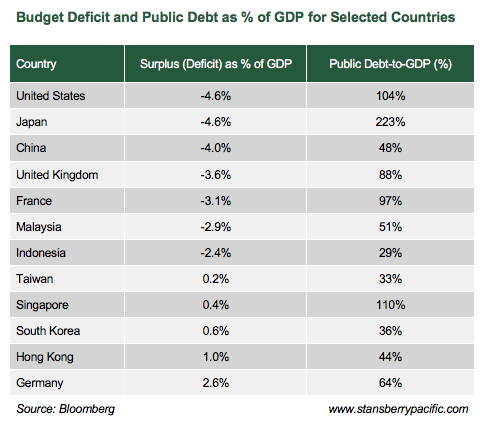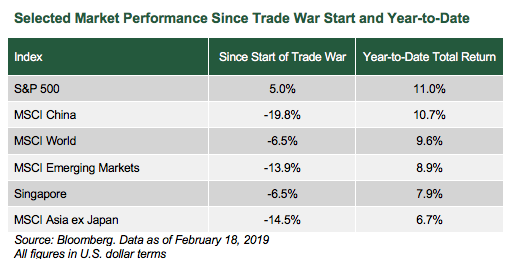If there’s one thing that governments are good at, it’s spending money.
Q4 hedge fund letters, conference, scoops etc

Just consider some recent news…
After posting 17 straight years of budget deficits (when the government spends more than it generates in taxes), U.S. government debt has now reached US$22 trillion. That’s equivalent to 112 percent of the entire annual output of the U.S. economy.
This number is so huge that the interest payments alone amount to US$371 billion a year, or nearly 10 percent of the annual federal budget.
So the debt keeps growing.
Of course, the U.S. dollar is a reserve currency. It accounts for 63 percent of the world’s reserve currency. That means there’s a constant stream of investors and other governments who are willing to accumulate dollars… and buy U.S. government debt.
Other countries aren’t so lucky.
From 2013 to 2017, Brazil racked up a combined budget deficit equivalent to 36 percent of the nation’s GDP. That’s pushed Brazil’s national debt-to-GDP from 51 percent to 74 percent.
Without currency reserve status, governments seeking loans are treated just like any normal person. If you borrow too much, your cost of borrowing rises, especially when you appear to be spending beyond your means.
For Brazil, the cost was a doubling of interest rates – from almost 7 percent to 14 percent. Its economy suffered its worst recession in history, and its GDP today is still 6 percent below 2014 levels.
Why Asian countries avoid debt
Asian countries learned the hard way to avoid debt.
During the Asian financial crisis of 1997, Asian governments saw how an excessive and rapid rise in debt led to the collapse of their currencies.
The Thai baht, for instance, lost 40 percent in a matter of 13 months (June 1997 to July 1998). The Indonesia rupiah fell 83 percent, the Philippine peso dropped 37 percent and the Malaysian ringgit lost 34 percent over the same period.
It’s a painful experience they don’t want to go through again.
So – with the exception of Japan – most Asian governments have been avoiding debt, even as the world’s largest economies have been binging on it.
As you can see from the table above, four out of the five economies that posted budget surpluses (when a government takes in more in taxes then it spends) last year were Asian.
Meanwhile, the three Asian economies (China, Malaysia and Indonesia) that have budget deficits also have relatively low debt levels. And they have strong and growing economies, which enable them to keep their debt-to-GDP levels low despite these deficits.
Singapore, meanwhile, is a unique case. It has a high debt-to-GDP ratio despite enjoying a budget surplus. That’s because Singapore’s government issues debt to develop the domestic debt market, primarily pension funds (like the Central Provident Fund).
The Singapore government owes very little to other governments or international investors. Instead, it borrows money from the CPF and reinvests it in the economy.
Singapore is obsessed with saving
Singapore is one of the world’s wealthiest nations in terms of GDP per capita (it ranks No. 8, right below the U.S.), and it’s obsessed with saving.
The Singapore government had a budget surplus in 16 out of the last 21 years.
Because of this, Singapore hasn’t borrowed money to finance government expenditures since the 1980s.
Moreover, Singapore has more than US$600 billion in fiscal reserves – that is, the money that it has accumulated in terms of savings after decades of surpluses. That’s nearly twice the size of its GDP.
It’s also the only country that constitutionally protects its fiscal reserves. The government needs the consent of the president before it can draw on its reserves.
As a result, Singapore is one of the world’s most financially-stable economies. It has the world’s third-largest fiscal reserves per capita – at US$44,531 per Singaporean.
That compares with US$9,701 for Japan, US$11,072 for Norway, US$778 for the Philippines and US$366 for the U.S.
Why is saving important?
Having a large pool of government savings is important for two reasons.
First, it’s a defensive tool that can be used during times of weakening economic growth.
For example, Singapore is one of the countries most impacted by the U.S.-China trade war. That’s because it’s the most trade-friendly country in the world, with an international trade-to-GDP ratio of 400 percent.
That’s twice the trade-to-GDP ratio of Vietnam and seven times that of the Philippines.
Singapore’s top exports include electronic products, such as computers, hard drives, semiconductors, smartphones, as well as petroleum products.
That means Singapore’s economy is extremely vulnerable to a slowdown in global trade, which has been happening.
Last year, Singapore’s GDP growth slowed to 3.2 percent after expanding 3.9 percent in 2017.
Its exports fell 8.5 percent in December – the largest decline in two years – with electronics exports falling 11.2 percent.
But despite the weakness in Singapore’s exports, its stock market has performed well compared with the rest of Asia.
Since the start of the trade war, Singapore’s stock market fell 6.6 percent compared with a 19.8 percent fall in the MSCI China Index and a 13.9 percent drop in the MSCI Emerging Markets Index.
That has a lot to do with Singapore having enormous fiscal reserves. This is a big cushion that will help Singapore get through the current downturn in global trade.
It has the reserves to undertake spending programmes that will help boost growth even as trade weakens.
And having large fiscal reserves provides an extra revenue stream for the government.
Singapore’s government generated US$11 billion in income from investment of its reserves in 2017. That’s the equivalent of nearly US$2,000 for every man, woman and child in Singapore that wasn’t generated from taxes.
To put that in perspective, it’s the equivalent of the U.S. government generating an extra US$610 billion each year.
In short, Singapore – despite not having a reserve currency – is prepared for any downturn or crisis that comes its way.
This unique characteristic makes Singapore one of my favourite markets to invest in. So if you’re worried about your nation drowning in debt, you might want to consider diversifying your portfolio – and investing in this market.
Good investing,
Brian Tycangco
Editor, Stansberry Pacific Research


